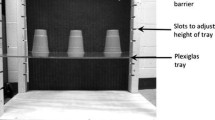Abstract
Adaptive decision making in humans depends on feedback between monitoring, which assesses mental states, and control, by which cognitive processes are modified. We investigated the extent to which monitoring and control interact iteratively in monkeys. Monkeys classified images as birds, fish, flowers, or people. At the beginning of each trial, to-be-classified images were not visible. Monkeys touched the image area to incrementally brighten the image, referred to as the brighten response. The amount by which brightness increased with each brighten response was unpredictable, and the monkeys could choose to classify the images at any time during a trial. We hypothesized that if monkeys monitored the status of their classification decision then they would seek information depending on the amount of information available. In Experiment 1, monkeys rarely used the brighten response when images were bright initially, and they used the brighten response more when earlier uses in a given trial yielded smaller amounts of information. In Experiment 2, monkeys made more brighten responses when the presented image did not belong in any of the trained categories, suggesting monkeys were sensitive to the fact that they could not reach a classification decision despite the image brightening. In Experiment 3, we found that the probability that monkeys used the brighten response correlated with their ability to correctly classify when the brighten response was not available. These findings add to the literature documenting the metacognitive skills of nonhuman primates by demonstrating an iterative feedback loop between cognitive monitoring and cognitive control that allows for adaptive information-seeking behavior.





Similar content being viewed by others
References
Aron A, Aron E (1999) Statistics for psychology. Prentice Hall, Upper Saddle River, NJ
Basile BM, Hampton RR, Suomi SJ, Murray EA (2009) An assessment of memory awareness in tufted capuchin monkeys (Cebus apella). Anim Cogn 12(1):169–180
Basile BM, Schroeder GR, Brown EK, Templer VL, Hampton RR (2015) Evaluation of seven hypotheses for metamemory performance in rhesus monkeys. J Exp Psychol Gen 144(1):85–102
Benjamin AS, Bjork RA, Schwartz BL (1998) The mismeasure of memory: when retrieval fluency is misleading as a metamnemonic index. J Exp Psychol Gen 127(1):55–68
Beran MJ, Smith JD (2011) Information seeking by rhesus monkeys (Macaca mulatta) and capuchin monkeys (Cebus apella). Cognition 120(1):90–105
Beran MJ, Brandl J, Perner J, Proust J (eds) (2012) Foundations of metacognition. Oxford University Press, Oxford
Brown EK, Templer VL, Hampton RR (2017) An assessment of domain-general metacognitive responding in rhesus monkeys. Behav Proc 135:132–144
Brown EK, Basile BM, Templer VL, Hampton RR (2019) Dissociation of memory signals for metamemory in rhesus monkeys (Macaca mulatta). Anim Cogn 22(3):331–341
Call J, Carpenter M (2001) Do apes and children know what they have seen? Anim Cogn 3(4):207–220
Castro L, Wasserman EA (2013) Information-seeking behavior: exploring metacognitive control in pigeons. Anim Cogn 16(2):241–254
Dunlosky J, Bjork RA (2008) The integrated nature ofmetamemory and memory. In: Dunlosky J, Bjork RA (eds) Handbook of metamemory and memory. Psychology Press, New York, NY, pp 11–28
Ferrigno S, Kornell N, Cantlon JF (2017) A metacognitive illusion in monkeys. Proc R Soc B Biol Sci 284(1862):20171541
Flavell JH (1979) Metacognition and cognitive monitoring: a new area of cognitive–developmental inquiry. Am Psychol 34(10):906–911
Fujita K (2009) Metamemory in tufted capuchin monkeys (Cebus apella). Anim Cogn 12(4):575–585
Hampton RR (2001) Rhesus monkeys know when they remember. Proc Natl Acad Sci 98(9):5359–5362
Hampton RR (2009) Multiple demonstrations of metacognition in nonhumans: converging evidence or multiple mechanisms? Comp Cogn Behav Rev 4:17–28
Hampton RR, Hampstead BM (2006) Spontaneous behavior of a rhesus monkey (Macaca mulatta) during memory tests suggests memory awareness. Behav Proc 72(2):184–189
Hampton RR, Zivin A, Murray EA (2004) Rhesus monkeys (Macaca mulatta) discriminate between knowing and not knowing and collect information as needed before acting. Anim Cogn 7(4):239–246
Hampton RR, Engelberg JW, Brady RJ (2020) Explicit memory and cognition in monkeys. Neuropsychologia 138:107326
Koriat A (2000) The feeling of knowing: Some metatheoretical implications for consciousness and control. Conscious Cogn 9(2):149–171
Kornell N (2009) Metacognition in humans and animals. Curr Dir Psychol Sci 18(1):11–15
Marsh HL, MacDonald SE (2012) Orangutans (Pongo abelii) “play the odds”: Information-seeking strategies in relation to cost, risk, and benefit. J Comp Psychol 126(3):263
Metcalfe J (2009) Metacognitive judgments and control of study. Curr Dir Psychol Sci 18(3):159–163
Nelson, Narens (1990) Metamemory: a theoretical framework and new findings. Psychology of learning and motivation, vol 26. Academic Press, pp 125–173
Proust J (2007) Metacognition and metarepresentation: is a self-directed theory of mind a precondition for metacognition? Synthese 159(2):271–295
Roberts WA, McMillan N, Musolino E, Cole M (2012) Information seeking in animals: metacognition? Comp Cogn Behav Rev 7:85–109
Rosati AG, Santos LR (2016) Spontaneous metacognition in rhesus monkeys. Psychol Sci 27(9):1181–1191
Shimamura AP, Squire LR (1986) Memory and metamemory: a study of the feeling-of-knowing phenomenon in amnesic patients. J Exp Psychol Learn Mem Cogn 12(3):452–460
Smith JD (2009) The study of animal metacognition. Trends Cogn Sci 13(9):389–396
Templer VL, Gazes RP, Hampton RR (2019) Co-operation of long-term and working memory representations in simultaneous chaining by rhesus monkeys (Macaca mulatta). Q J Exp Psychol 72(9):2208–2224
Tu HW, Pani AA, Hampton RR (2015) Rhesus monkeys (Macaca mulatta) adaptively adjust information seeking in response to information accumulated. J Comp Psychol 129(4):347–355
Acknowledgements
We thank Tara A. Dove-VanWormer for help with monkey testing.
Funding
This work was supported by National Science Foundation Grants BCS-1632477 and BCS-1946767, and by ORIP/OD P51OD011132.
Author information
Authors and Affiliations
Corresponding author
Ethics declarations
Conflicts of Interest
Authors declare no conflicts of interest.
Availability of data and material
Available upon request.
Additional information
Publisher's Note
Springer Nature remains neutral with regard to jurisdictional claims in published maps and institutional affiliations.
Supplementary Information
Below is the link to the electronic supplementary material.
Rights and permissions
About this article
Cite this article
Brady, R.J., Hampton, R.R. Rhesus monkeys (Macaca mulatta) monitor evolving decisions to control adaptive information seeking. Anim Cogn 24, 777–785 (2021). https://doi.org/10.1007/s10071-021-01477-5
Received:
Revised:
Accepted:
Published:
Issue Date:
DOI: https://doi.org/10.1007/s10071-021-01477-5




